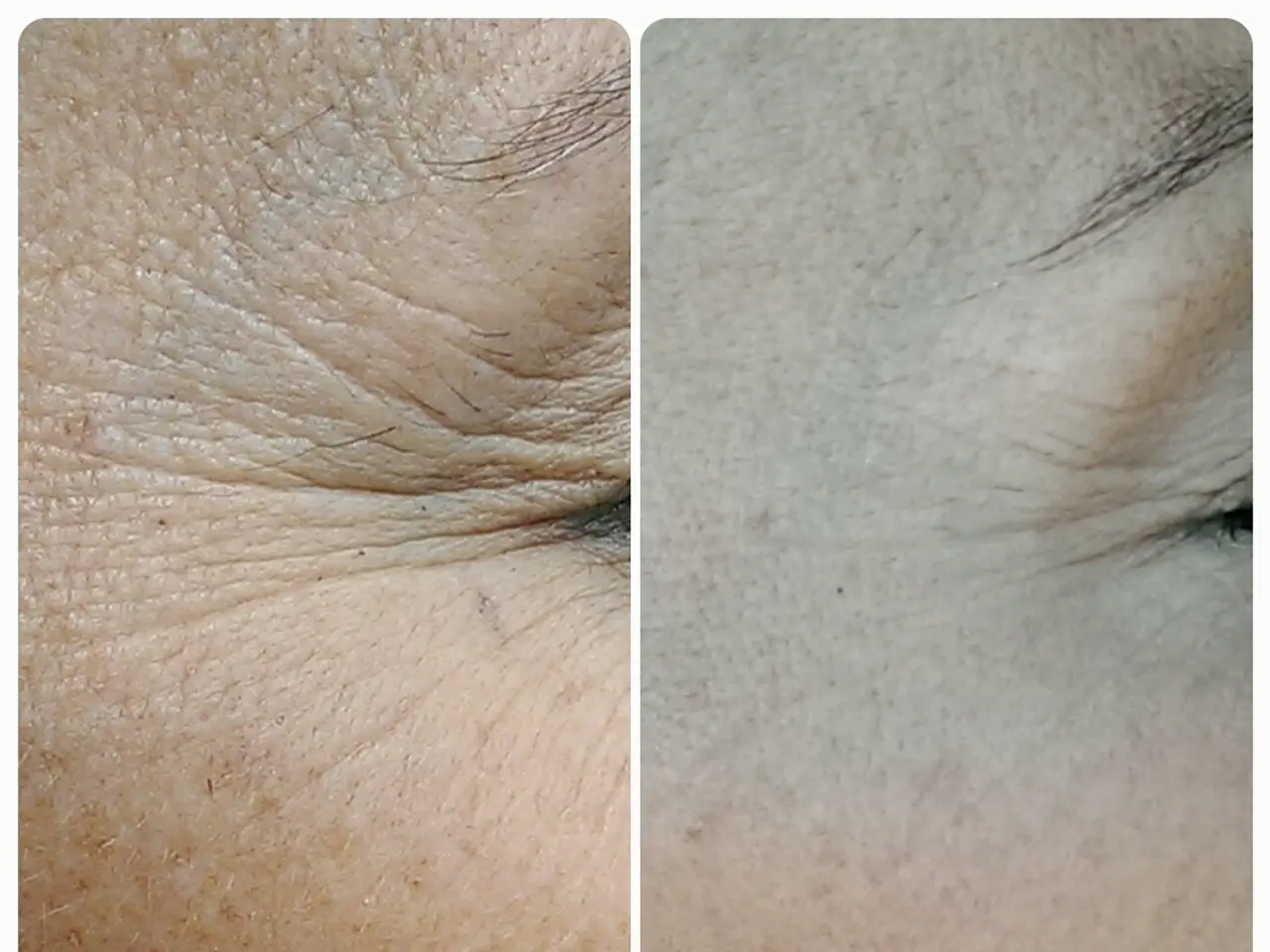Skin Health: Advantages, Disadvantages, and Origins of Antioxidants
In the realm of skincare, antioxidants have become a buzzword due to their numerous benefits. These substances, found in a variety of sources such as fruits, vegetables, supplements, and skincare products, play a crucial role in counteracting cell damage caused by free radicals and oxidative stress.
One of the key antioxidants recommended by the American Academy of Dermatology (AAD) is Vitamin C. Known for its brightening and collagen-stimulating properties, Vitamin C can help protect the skin from free radical damage, brighten the complexion, and promote collagen production, which aids in reducing wrinkles and maintaining youthful skin.
Niacinamide and Ferulic acid are other antioxidants often supported by dermatologists. Niacinamide offers anti-inflammatory and skin barrier strengthening benefits, while Ferulic acid enhances and stabilizes the effects of other antioxidants like Vitamin C or niacinamide.
These antioxidants help prevent photoaging and oxidative damage caused by UV exposure and environmental factors, contributing to healthier, more resilient skin. However, it's important to note that while many antioxidant skincare products are available, evidence regarding their impact on skin cells varies.
Mineral sunscreens remain the top preventive recommendation by dermatologists due to UV damage being the leading cause of wrinkles and skin aging. Antioxidants are often suggested as a complementary measure.
The AAD also recommends some skincare products containing antioxidants like retinoids, vitamin C, or vitamin E, but advises caution for others. Retinoids, such as retinol, are popular for improving uneven skin tone, pigmentation, and texture. However, they are not suitable for people with skin allergies, dryness, pregnancy, or hormonal acne.
Supplements containing antioxidants may interact with medications prescribed by doctors, so it's important to check first before taking them. Retinoid users must also use sunscreen, as these products make the skin more sensitive to sun damage.
People with certain conditions should consult a dermatologist before using retinoid products. The AAD advises wearing sunscreen when using retinoid products as well.
Antioxidants like carotenoids, zinc, selenium, and vitamin E can improve the skin by reducing DNA damage from UV light, improving hydration, stimulating collagen and elastin production, reducing the appearance of wrinkles and pigmentation, supporting healing processes, reducing inflammation, and softening.
Other key antioxidants for skin health include vitamin A, vitamin C, selenium, zinc, copper, carotenoids, polyphenols, and bakuchiol. However, the author advises against using large doses of antioxidants for prolonged periods without seeking medical advice, as this may cause adverse effects.
In summary, antioxidants play a vital role in skincare, helping to protect the skin from harmful UV radiation and oxidative damage. While mineral sunscreens remain the top preventive recommendation, antioxidants are often suggested as a complementary measure. Always consult a dermatologist if you have concerns about your skin, and be mindful of potential interactions with medications when using supplements containing antioxidants.
- In addition to Vitamin C, Niacinamide and Ferulic acid are other antioxidants backed by dermatologists.
- Niacinamide offers anti-inflammatory benefits and strengthens the skin barrier.
- Ferulic acid enhances and stabilizes the effects of other antioxidants like Vitamin C or niacinamide.
- Mineral sunscreens are the top preventive measure recommended by dermatologists due to UV damage being the leading cause of wrinkles and skin aging.
- Antioxidants are suggested as a complementary measure along with mineral sunscreens.
- The American Academy of Dermatology (AAD) recommends skincare products containing antioxidants like retinoids, vitamin C, or vitamin E.
- Retinoids, such as retinol, are popular for improving uneven skin tone, pigmentation, and texture.
- However, retinoid products should be used with caution, especially for people with skin allergies, dryness, pregnancy, or hormonal ac conditions.
- Supplements containing antioxidants may interact with medications prescribed by doctors, so it's important to check before taking them.
- Retinoid users must also use sunscreen, as these products make the skin more sensitive to sun damage.
- Other conditions like autoimmune disorders, chronic diseases, or neurological disorders may require specialist advice before using retinoid products.
- Carotenoids, zinc, selenium, and vitamin E are antioxidants that can improve the skin by reducing DNA damage from UV light.
- Other key antioxidants for skin health include vitamin A, vitamin C, selenium, zinc, copper, carotenoids, polyphenols, and bakuchiol.
- The author advises against using large doses of antioxidants for prolonged periods without seeking medical advice, as this may cause adverse effects.
- Antioxidants like retinol are not only beneficial for skin health but also play a crucial role in eye-health and hearing.
- Health and wellness, fitness and exercise, sexual health, and even cardiovascular health can benefit from the right balance of antioxidants as part of a healthy lifestyle.
- Cancers, respiratory conditions, digestive health issues, and even autoimmune disorders may be influenced by nutrition and the amount of antioxidants in our diets.
- Cooking methods, choosing global cuisines, and practicing healthy cooking can contribute to a well-balanced diet rich in antioxidants.
- Parenting, car maintenance, shopping, and electric vehicles are not directly related to antioxidants, but they are all part of a balanced, healthy lifestyle and can be reviewed through product-reviews and lifestyle articles online.




